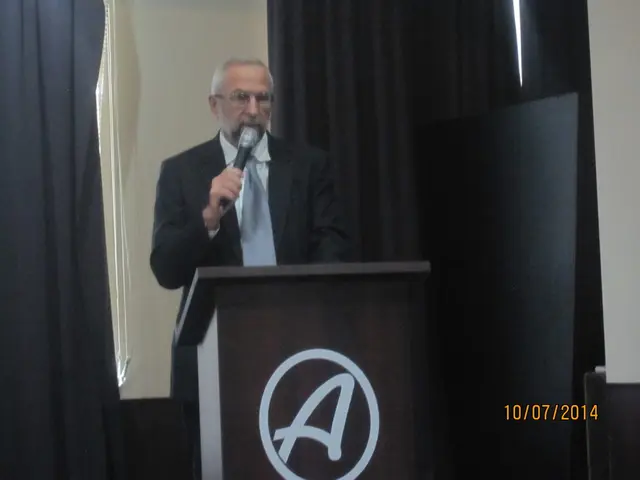Philosophical Dispute: Exploration of Existentialism and Realism
In the realm of philosophy, two distinct schools of thought - existentialism and realism - offer contrasting perspectives on individual existence, freedom, and the pursuit of meaning.
Existentialism, a philosophy that gained prominence in the mid-20th century, places a central emphasis on individual existence and choice. According to existentialists, humans first exist and then create their own meaning in a world without inherent purpose. This perspective, known as "existence precedes essence," highlights the radical freedom of individuals to shape their own lives, with failure to acknowledge this freedom being called "bad faith."
In contrast, realism, in the philosophical sense, generally holds that there is an objective reality independent of individual beliefs or feelings. While the nature of realism's stance on individual existence and freedom may not be explicitly stated, realism implies that meaning or truth exists objectively, and that individual understanding aligns with that external reality. Realism tends to emphasise facts, external conditions, and a stable world that limits the scope of purely subjective freedom.
| Aspect | Existentialism | Realism | |-----------------------|------------------------------------------------------|------------------------------------------------------| | View on Individual | Central focus on individual existence and choice; individuals create meaning | More focused on objective reality beyond individual interpretation | | Freedom | Radical freedom to define oneself; responsibility for self-creation | Freedom constrained or informed by external realities and facts | | Pursuit of Meaning | Meaning is subjective and self-created through authentic choices | Meaning or truth is objective, existing regardless of personal belief |
Existentialism views life as without inherent meaning, requiring individuals to impose their own through freedom and choice. Realism, on the other hand, assumes an external world whose nature is independent of individual perspective, anchoring existence and meaning more in objective truth than in subjective freedom.
While existentialism is often contrasted with absurdism, which highlights the contradiction of humans seeking meaning in a meaningless universe, realism situates itself in the tradition of affirming an external reality that can be known or approximated.
In various fields like education and critical thinking, realism's emphasis on rationality and evidence-based reasoning is relevant. Realism also takes a more nuanced view of freedom and determinism, acknowledging the influence of both internal and external factors on human behavior. However, realism does not necessarily address existential questions of meaning and purpose directly.
Realism provides a foundational framework for understanding the natural world, emphasising the importance of empirical evidence and objective observation. It adopts a more objective approach to morality and ethics, grounded in principles of rationality and empirical observation. Realism tends to approach meaning and purpose from a more practical and empirical standpoint, emphasising the pursuit of knowledge and understanding through scientific inquiry.
Realism seeks to identify universal ethical principles that apply across different contexts and cultures. It maintains a more neutral stance towards traditional values and institutions, recognising their role in maintaining social order and stability. The practical applications of realism are evident across a wide range of disciplines, particularly in the sciences and social sciences.
In the existentialist view, humans are responsible for imposing meaning on a world devoid of intrinsic purpose through their choices and acceptance of responsibility for their actions, demonstrating the essence of "bad faith" when denying their freedom.
Mindfulness, self-reflection, and identity are all important aspects of the existentialist's journey, as they encourage individuals to delve deep into their consciousness and assess their values and beliefs to create their unique sense of purpose.
On the other hand, in the realm of realism, ethics and morality are grounded in objective reality and rational principles, offering a universal framework for evaluating human behavior and guiding decision-making processes.
The study of human nature, psychology, and consciousness plays a crucial role in understanding the intricacies of individual existence, shedding light on the complex interplay between free will and external factors in shaping one's identity and worldview.
Society, culture, and literature all play active roles in defining these philosophies, serving as mirrors that reflect the underlying beliefs and values held by individuals and institutions within a given timeframe.
By valuing critical thinking, logic, and evidence-based reasoning, realism fosters a culture of education and self-development, emphasizing the importance of knowledge acquisition and the pursuit of truth for societal benefit.
In contrast to existentialism's emphasis on subjective choice and self-creation, realism presents an orientation towards a more objective world guided by principles of rationality and empirical observation.
Existentialism's exploration of human nature and the human condition challenges individuals to question their beliefs, grow in self-awareness, and develop a sense of purpose rooted in their own authentic choices.
Realism, on the other hand, offers a framework for understanding the external world and human behavior in an objective light, providing a stable foundation for ethics, morality, and truth in a complex and diverse society.
Ultimately, both philosophies offer valuable insights into critical aspects of human existence, influencing perspectives on self, society, and the search for meaning in our lives.




